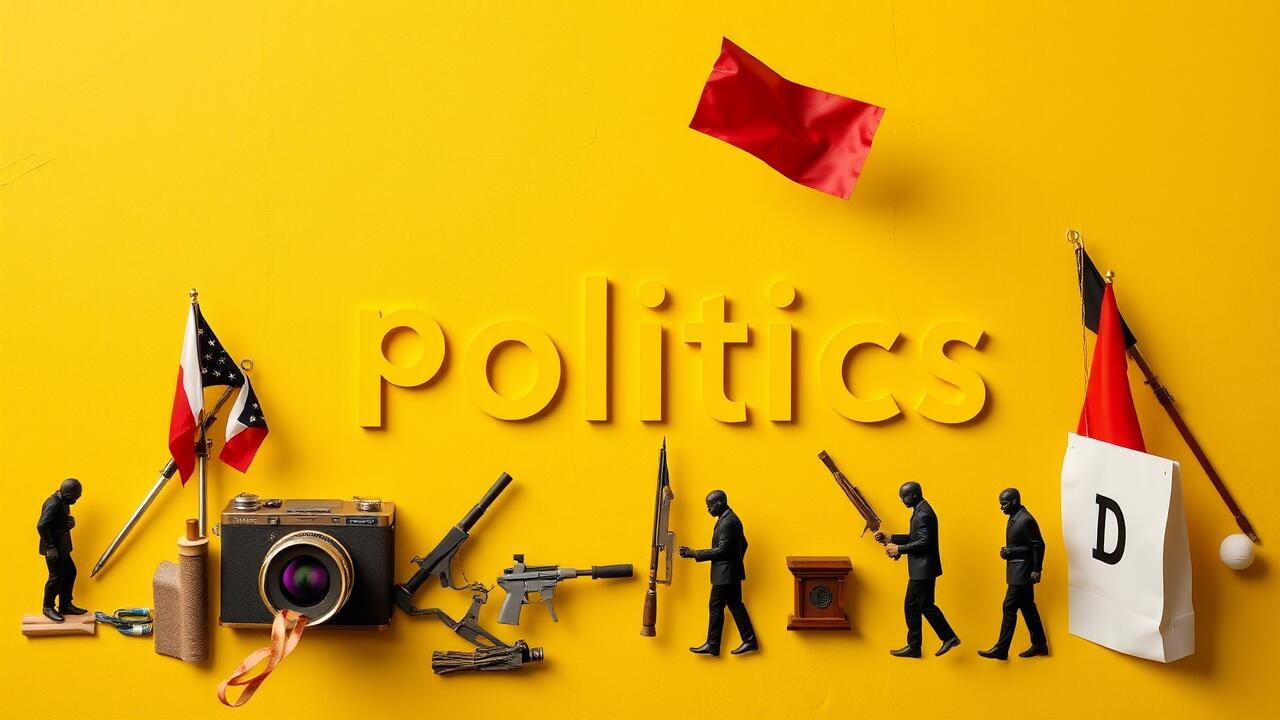Understanding the Impact of Politics on Society and Daily Life
Key Takeaways
- Comprehending Governance Dynamics
- Investigating Political Studies
- Summary of Governance Structures
- The Impact of Political Traditions
- Staying Informed on Governance Updates
Understanding Politics
Politics encompasses a broad spectrum of activities and theories that shape societies and influence governance. It is essential to understand political ideology and domestic politics as they frame the political views and actions of politicians. Comparative politics allows for the evaluation of different political systems, facilitating political analysis and insights into how various governments function. Political thought and political philosophy provide foundational knowledge that informs debates on political representation and global politics. Engaging with political sociology enhances understanding of how social factors influence political behavior and decision-making within the context of U.S. politics and beyond. As a dynamic field, political science continually adapts to the changing landscapes of power and authority.

Definition and Importance of Politics
Politics encompasses a wide range of activities and ideologies that shape the governance and structure of society. Within the political spectrum, various political ideologies emerge, from right-wing politics to progressive movements, all vying for political legitimacy. Political campaigns play a crucial role in this arena, as political leaders mobilize resources and public support to influence decision-making. The history of political thought provides insight into how political theorists have interpreted the relationship between power and society, emphasizing concepts like political realism and political economy.
Understanding the importance of politics goes beyond merely recognizing its definitions. The phrase "the personal is political" highlights how individual experiences and identities are intertwined with wider political issues. Political geography examines how spatial factors affect political systems and behaviors, influencing everything from voter turnout to policy formation. The role of money in politics raises ethical questions about the influence of wealth on electoral outcomes and governance, underscoring the necessity of scrutinizing both political and non-political dynamics in shaping societal norms.
The Role of Politics in Society
Politics serves as the backbone of societal organization and governance. It creates systems that enable individuals to express their ideologies, whether rooted in left-wing politics or other beliefs. Political entities operate within this framework, influencing the distribution of power and resources. The concept of political liberty is closely linked to democracy, allowing citizens to participate actively in governance. Political patronage and the role of political machines can sometimes complicate this ideal, blending activism with the pursuit of power.
The interplay between politics and social movements shapes public policies and societal norms. Radical democracy challenges traditional structures, advocating for broader participation in political processes. Partisan warfare can polarize communities, often hindering collaborative efforts toward progress. As political globalization continues to evolve, the index of politics articles highlights various dynamics at play across nations. The political compass offers insights into these ideological divides, illustrating how diverse perspectives impact governance.
Exploring Political Science
Political science encompasses a broad range of topics that explore the intricacies of politics and governance. Key concepts within this field include the analysis of various political entities, the structure of elections, and the roles played by different groups such as republicans and liberals. As political philosophers have noted, understanding politics is crucial for grasping how political power is distributed and exercised among citizens and institutions. Political scientists examine the dynamics within congress and how these impact policy-making. The study of political systems, especially the functioning of democratic systems, further illustrates how politics emerges in response to societal needs and expectations. This ongoing discourse highlights the significance of political thought in shaping governance across different nations, demonstrating that politics spans multiple dimensions of human interaction and organization.

Key Concepts in Political Science
Political science encompasses a diverse array of concepts that help us understand the dynamics of governance and societal interactions. Central to this field are topics such as political power, which examines how authority is acquired and exercised within different political systems. Politics books and articles often delve into various political ideologies and phenomena, analyzing how these factors shape government politics and influence political culture. Studies politics through this lens can reveal the underlying principles that govern nations and impact world politics.
Key subjects in political science also include the analysis of political action and the mechanisms through which citizens engage in U.S. politics today. By exploring various political topics, researchers highlight how individual and collective behaviors contribute to the larger political landscape. Understanding these elements can provide clarity on debates surrounding political ideology today and how these ideas manifest in practical political scenarios. These concepts are essential for anyone seeking to grasp the complexities of political systems and their implications for society.
The Evolution of Political Thought
Historical developments have significantly shaped the landscape of political thought. The rise of various political systems has led to essential political distinctions among ideologies and governance methods. Political activity has evolved in response to changing political environments and pressing political issues, influencing how political institutions operate. The emergence of contemporary party politics reflects the need for more structured political orders and intricate political structures, often referenced in world politics readers.
Intellectual debates regarding political innovations have consistently prompted shifts in our understanding of governance. The evolution of political thought is evident in today's reliance on quick, accessible forms of information, often termed "30-second politics." These changes foster a dynamic political community that adapts rapidly to new demands and expectations. As diverse political systems engage with modern challenges, the ongoing evolution of political thought remains crucial for effective engagement within the global political environment.
Overview of Political Systems
Political systems serve as the framework within which the dynamics of politics unfold. They are essential for understanding how various political bodies operate and influence governance. The political evolution witnessed across nations reveals how different political methods have emerged, guided by public sentiment and the demands of political leaders. Political parties and candidates formulate strategic political campaigns to engage voters and foster political participation. The interplay between economic politics and the political process shapes the creation of political solutions to societal issues. A robust analysis of types of political systems uncovers the underlying political culture, which plays a critical role in determining the effectiveness of political advice and the implementation of policies. Political lists often serve as a roadmap for political candidates, helping to navigate the complex landscape of governance.
Types of Political Systems
Political systems can be defined by how they organize authority and decision-making within a state. In this context, political actors, including political elites and organizations, play a crucial role in shaping governance. Various political parties emerge under different systems, each with distinct agendas and moral values. British politics, for instance, showcases a mix of traditional and modern political inventions that continually redefine the balance between authority and citizen rights, creating a dynamic landscape shaped by political vulnerability and competition.
Different political systems can affect the way political awards are allocated and how political moralism shapes policy decisions. Systems categorized as democracies often emphasize the importance of political rights, allowing citizens to engage actively in politics. British politics today exemplifies how diverse political organizations contend for power and influence. These systems can also be susceptible to political attacks, heightening the stakes for political parties and the elites controlling them.
The Functioning of Democratic Systems
Democratic systems are characterized by their reliance on the participation of citizens through votes. Political manuscripts often outline the frameworks within which congress operates, fostering a platform for political ingenuity. In these systems, the presidency serves as a focal point for leadership, navigating the complex landscape of governance while addressing the needs and demands of the electorate. The dynamic interplay of expressed ideology among parties plays a crucial role in shaping policy decisions, reflecting both partisan differences and affiliations.
Despite the ideal of inclusive representation, democratic systems frequently grapple with substantial partisan divisions. The ideology gap between different political factions can create a considerable partisan gap, complicating the legislative process. European politics today reflects similar challenges, where varying political ideologies influence governance. The intricate dance of politics requires effective negotiation strategies to bridge these partisan differences, ensuring that the voices of all constituents are heard and represented in the democratic framework.
The Influence of Political Culture
Political culture encompasses the shared beliefs and values that shape the political landscape of a society. It influences the behavior of citizens, candidates, and leaders alike, impacting everything from presidential campaigns to voting patterns. In Washington, the dynamics of partisan cooperation often reflect the prevailing political culture, which can either facilitate or hinder effective governance. Liberal ideas may gain traction within certain segments of the population, leading to the rise of specific candidates who resonate with those values. Conflicts within political culture can result in polarized campaigns, where divisive rhetoric dominates and influential positions become battlegrounds for power. Understanding the intricacies of political culture allows for a deeper insight into how governments operate and how conflicts arise in the realm of politics.
Defining Political Culture
Political culture encompasses the shared beliefs, values, and attitudes that shape the political behavior of individuals and groups within a society. In the context of U.S. elections, this cultural framework influences how voters interact with candidates and parties, often drawing lines along partisan affiliations. The legitimacy of elections is frequently scrutinized through the lens of political culture, affecting the trust voters place in election commissions and the overall democratic process. Leaders must navigate this landscape to maintain public support, especially in contested elections where affairs and relations between different political factions can become strained.
A contested concept, political culture also reflects historical contexts and socio-economic factors that impact governance. Justice and equity become central themes as societies evolve, creating diverse expectations from political leaders and their parties. During national elections, the sentiments of the electorate are palpable, shaping the strategies of candidates seeking reelection. The interplay of various elements within political culture informs how politics are conducted, influencing both policy outcomes and the broader political discourse.
How Political Culture Shapes Governance
Political culture profoundly influences governance by shaping the attitudes and opinions of citizens toward politics. Contemporary proponents of various political ideologies often highlight the significance of political culture in determining candidate choices during elections. For instance, the republican party's leadership may reflect the interests and values prevalent within specific communities, which guide democratic participation. Political scientist Michael argues that these cultural elements are fundamental in defining the democratic principle, ultimately affecting how decisions are made within a democratic form of governance, including the role of the electoral college.
Governance structures are also impacted by varying political cultures, which dictate expectations of political behavior and engagement among citizens. This cultural framework informs how leaders approach democratic decision-making, aligning their policies with the interests of their constituents. As political attitudes evolve, they reshape the landscape of politics, influencing not only party dynamics but also the overall effectiveness of governance. Candidates who resonate with cultural values tend to garner more support, highlighting the integral connection between political culture and the mechanisms of governance.
Keeping Up with Politics News
Staying informed about politics requires awareness of various sources that provide insights into the activities of powerful elites, military developments, and the dynamics of power relations within modern nation states. News on politics often highlights the delicate balance between freedoms and state bureaucracy, shedding light on the sentiments that influence public opinion and governance. The concept of chimpanzee politics power illustrates the primal aspects of political maneuvering, emphasizing the competitiveness inherent in aggregative democracy. Readers can explore how direct democracy offers alternatives to traditional governance structures and examine the role of politique in shaping legislative outcomes. Engaging with multiple perspectives fosters a deeper understanding of how peace and conflict interplay within the basic polity of society.
Major Sources of Political News
Political news serves as a critical lens through which the public observes the operations of state governments and the candidates vying for power. Media outlets, including newspapers, television networks, and online platforms, cover a spectrum of politics from local elections to the national stage. During election cycles, coverage focuses on presidential candidates and their supporters, highlighting their policies and the criticism they may face from different parties. The electoral college system often sparks debate, as it can significantly influence the outcome of elections and shape the future of a new nation state.
Social media has emerged as a powerful source of political news, allowing citizens to engage directly with representatives and share their opinions. This platform amplifies voices advocating for good candidates and fosters discussions about oppressive power relations within the political framework. Open elections empower voters to make informed choices, illuminating the diverse perspectives within a country. As politics continues to evolve, staying informed through various sources remains essential for understanding the dynamics at play.
Conclusion
Politics serves as the backbone of societal structure, influencing every aspect of governance and citizen engagement. Understanding the intricacies of comparative government enables voters to make informed choices that reflect their values and priorities. Political discourse often navigates through pure conflict, highlighting the diverse opinions that exist within an aggregative democracy. By exploring these nuances, individuals gain insight into how collective interests can be balanced against individual rights, ultimately shaping the political landscape and guiding future developments.
FAQS
What is the definition of politics?
Politics is the process by which groups of people make collective decisions, often involving governance, power dynamics, and the allocation of resources within societies.
Why is politics important in society?
Politics is crucial as it shapes laws, policies, and the overall structure of society, influencing how power is distributed, how resources are allocated, and how the rights and responsibilities of citizens are determined.
What are the main types of political systems?
The main types of political systems include democracies, autocracies, monarchies, and oligarchies, each characterized by different forms of governance and power distribution.
How does political culture influence governance?
Political culture encompasses the beliefs, values, and attitudes of a society towards politics. It shapes how citizens engage with governance, affects political behavior, and influences the effectiveness and legitimacy of political institutions.
Where can I find reliable political news?
Reliable political news can be found in major news outlets such as BBC, CNN, The New York Times, and The Guardian, as well as dedicated political news websites like Politico and FiveThirtyEight. It's important to consult multiple sources to get comprehensive and balanced views.
What is the role of a politics desk in analyzing political phenomena?
A politics desk serves as a crucial platform for discussing various political subjects, exploring the dynamics of political freedom within different political entities, and examining how partisan lines influence political parties and the political authority of a given system. This politics series often delves into the ways politics manifests in new nation states, addressing aggregative democracy claims and the impact of such democracy on the political body at large.
How do different political entities influence the way politics is conducted in various regions?
Different political entities, such as political parties and governments, significantly influence the way politics is conducted. The characteristics of these entities shape the political phenomenon in a given area, leading to varying outcomes in governance and policy-making. The English word politics encompasses these dynamics, and recognition in the form of politics awards often highlights the impact of these entities on the broader political landscape.
How do political parties impact the landscape of politics in a given region?
Political parties serve as essential political entities that shape the dynamics of politics by establishing platforms, mobilizing voters, and influencing policy decisions within their regions.
What are the key factors that determine the effectiveness of a political party in shaping politics?
The effectiveness of a political party in shaping politics is influenced by various factors, including its organization, the strategies employed by the political entity, and its ability to engage voters. Additionally, the relationship between different political entities can significantly impact the overall landscape of politics, as competition and collaboration among political parties shape public policies and electoral outcomes.
What are the main aspects of politics that are important to understand for effective civic engagement?
Understanding the various elements of politics, including the role of political parties, the impact of political entities, and the influence of public policies, is crucial for effective civic engagement in politics.
What are the most common misconceptions about the nature of politics?
Many people believe that politics is solely about government and elections, but politics encompasses a broader spectrum, including social movements, community organizing, and advocacy. Understanding these dimensions is crucial for a comprehensive view of politics.
What are the main challenges faced in the study of politics today?
The study of politics today faces several challenges, including the impact of social media on political discourse, the rise of populism, and the polarization of political views. Understanding these dynamics is crucial to navigating the complex landscape of politics.
What are the main challenges faced in the study of politics today?
The study of politics today encounters various challenges, including the complexity of political systems, the influence of social media on public opinion, the polarization of political ideologies, and the difficulty in predicting political behaviors. These elements can significantly alter how politics is perceived and understood, complicating the analysis and study of politics.
What are the different branches of politics that individuals should be aware of?
Understanding the various branches of politics, such as domestic politics, international relations, and political theory, is essential for comprehending how politics operates in our society. These different areas of politics can influence policymaking and civic engagement, shaping the political landscape at local, national, and global levels.
What are some essential concepts that individuals should be familiar with to better navigate politics?
Understanding the various aspects of politics is crucial for effective participation and civic engagement. Key concepts include political ideologies, the role of government, electoral processes, and the influence of political parties. Grasping these fundamental elements of politics can enhance one’s ability to engage meaningfully in political discussions and activities.
